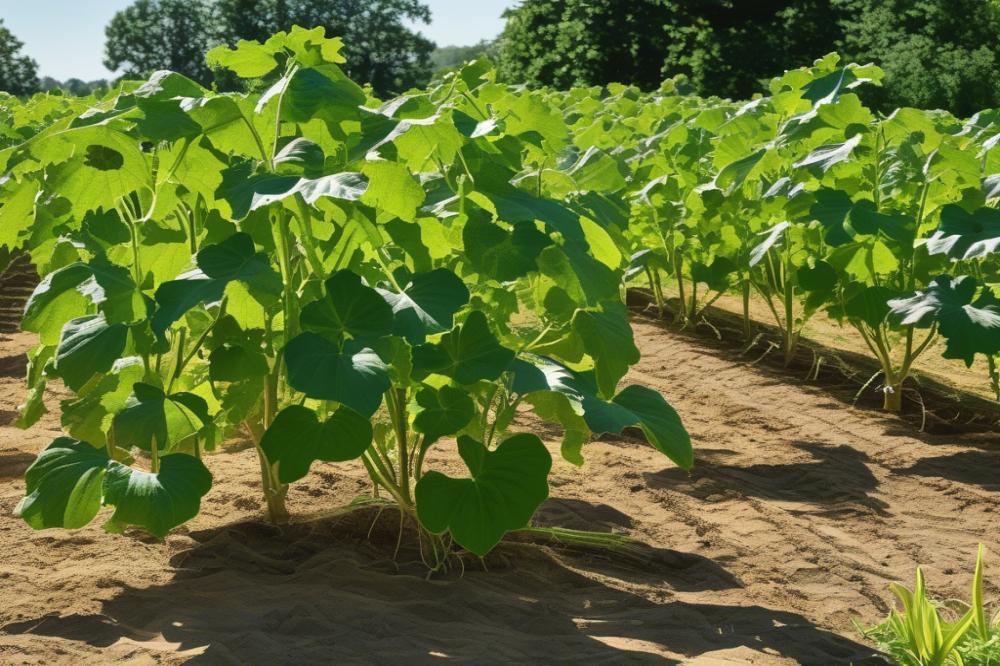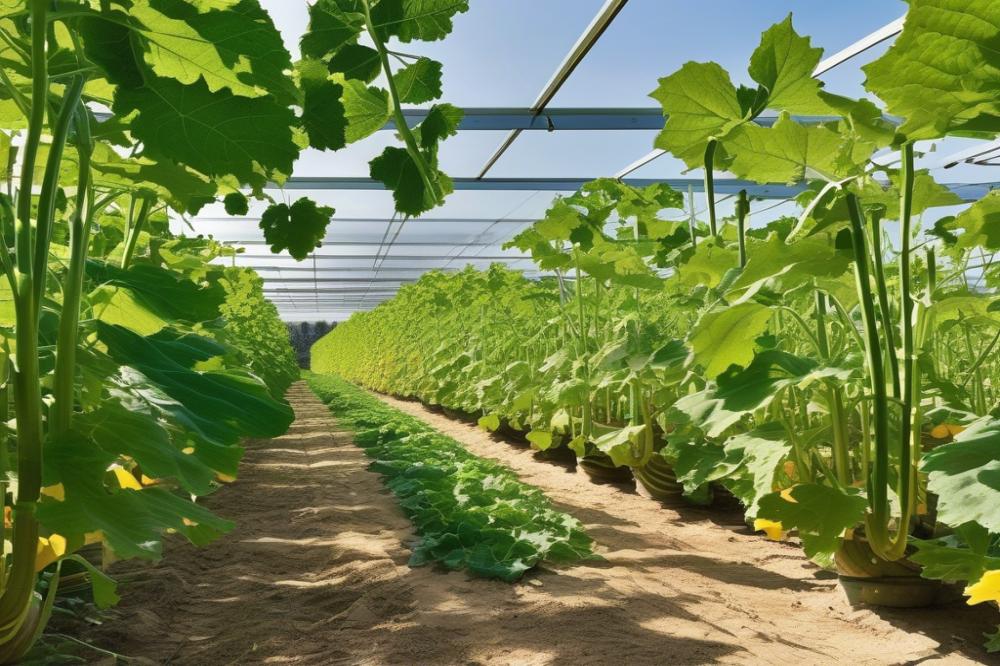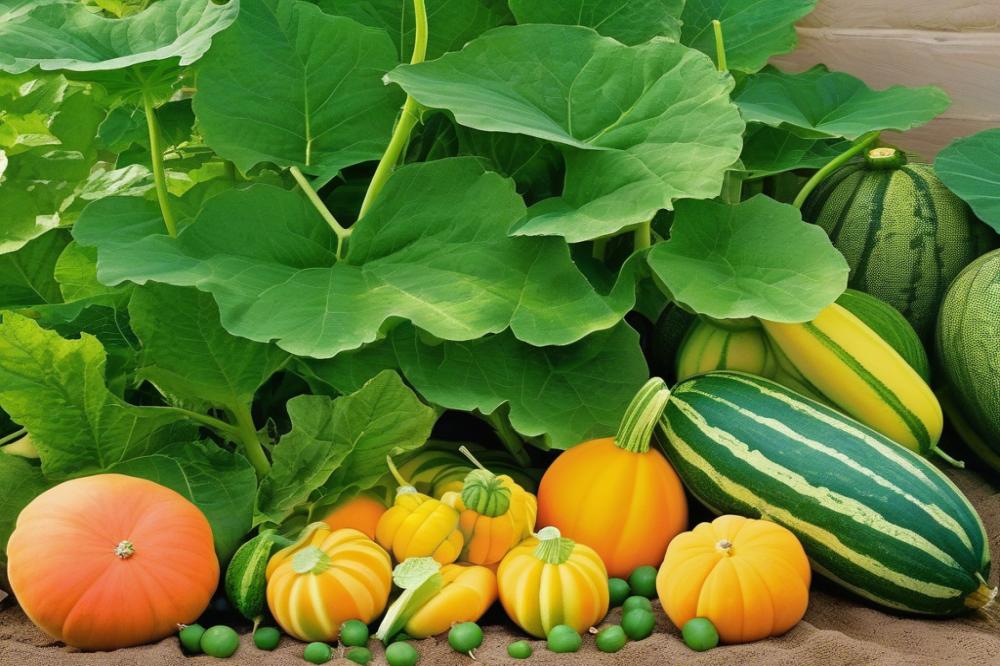Understanding vine borers in Your Garden
vine borers are notorious pests that can wreak havoc on both squash and melon crops. These insects lay eggs at the plant base, and when the larvae hatch, they tunnel through stems. Damage from these pests can lead to wilting plants and reduced yields. If you’re passionate about organic gardening or simply want a thriving garden, understanding how to prevent these pests is crucial.
Preventing vine borers is essential for maintaining plant health. Affected plants can struggle to produce, which ultimately impacts the harvest. With squash crops and melon varieties being popular choices for many gardeners, safeguarding them from these pests is a priority. Garden management practices focused on pest control can make a significant difference.
Many growers are turning to integrated pest management strategies to tackle this issue. Methods such as crop rotation can disrupt pest life cycles. Additionally, encouraging natural predators can provide an organic solution. Some gardeners might rely on insecticides, but these should be used with caution. Balancing these approaches can lead to effective borers prevention while minimizing harm to beneficial insects.
Understanding Vine Borers


Vine borers are a significant concern for anyone growing squash and melon crops. These pests belong to the family of clearwing moths. They look somewhat like wasps, but their presence can quickly devastate your garden. Adult moths are typically brownish with orange markings, while larvae are creamy-white, resembling small caterpillars.
Life Cycle and Behavior
The life cycle of these pests begins in late spring. Female moths lay eggs on the stems of host plants. After a week or so, larvae hatch and burrow into the plant’s stem. This action disrupts the plant’s natural flow of nutrients, leading to wilting and eventual death. Once inside, larvae feed voraciously, causing considerable damage. They can create holes in stems, leading to an unfortunate decline in plant health.
As summer progresses, larvae mature and prepare to exit the plant. They will pupate in the soil, emerging the following year as adult moths. This cycle makes early pest control essential in organic gardening practices. Timely interventions can help protect valuable crops.
Identifying Signs of Infestation
Recognizing signs of these pests is vital for effective management. Look for holes in the stems of squash and melon plants. Wilting, even in well-watered crops, can signal a problem. In addition, the presence of frass—small, sawdust-like droppings—may indicate that larvae are inside the plant. Yellowing leaves or sudden plant demise can further hint at a hidden infestation.
Using effective pest control techniques can minimize damage. Crop rotation serves as a preventive strategy by disrupting the borer’s life cycle. By changing planting locations each season, you can make it harder for these pests to re-establish themselves. Natural predators can also play a role in managing squash pests. Ladybugs and lacewings can help maintain balance in your garden management approach.
If infestation occurs, various insecticides are available. While chemical options exist, many gardeners prefer organic alternatives. Managing plant health through cultural practices reduces reliance on synthetic treatments. Maintaining a healthy growing environment, alongside vigilant monitoring, can significantly improve plant resilience against vine borers.
Impact on Squash and Melon Crops


The effects of pests on plant health can be devastating. Vine borers tunnel into stems, causing them to weaken. When this happens, the vascular system of the plant suffers. As a result, nutrient transfer becomes impaired, leading to reduced growth and poor yields. In addition, infected plants are more susceptible to diseases and other stressors.
Symptoms of Damage
Recognizing the signs of damage is critical for effective pest control. Look for wilting leaves that do not recover, especially during the hottest parts of the day. Yellowing stems may indicate a problem. Often, small holes will appear where borers entered. A presence of frass, which is a fine sawdust-like material, can also be found near these entry points. Large plants can suddenly collapse, leaving gardeners baffled. Catching these symptoms early can make a difference in protecting crops.
Comparisons with Other Squash Pests
When it comes to squash pests, some are more destructive than others. Aphids and squash bugs are common nuisances. However, their impacts differ from those of vine borers. Aphids mainly weaken plants through feeding, whereas the latter can lead to direct structural damage. This makes the management of vine borers critical. Organic gardening techniques often focus on crop rotation and introducing natural predators. These methods can reduce pest populations effectively. In severe cases, insecticides may be necessary, but they should always be used judiciously. Understanding these differences is key for any gardener looking to maintain healthy melon crops and thriving squash plants.
Effective Pest Control Strategies


Overview of Pest Control Methods for Vine Borers
Discovering effective methods for controlling pests is vital for healthy melon and squash crops. Integrated pest management combines various techniques to fight these pests. Gardeners commonly use insecticides to reduce infestations. However, it’s important to choose products that are safe for the environment. Preventative measures are also key. Crop rotation is a strategy that can disrupt the lifecycle of these pests. Changing plant locations each year helps keep them at bay. Regularly monitoring plants for signs of damage aids in early intervention.
Benefits of Organic Gardening in Managing Vine Borers
Organic gardening offers several advantages in the fight against pests. First, it promotes biodiversity, which can be great for plant health. Growing diverse crops attracts beneficial insects that help manage pests naturally. These insects serve as natural predators that control the squash pests effectively. Additionally, organic gardening practices reduce the need for synthetic chemicals that may harm the ecosystem. Using organic mulch can create a barrier against pests while adding nutrients to the soil. Overall, this method nurtures the garden environment while promoting sustainable practices.
Role of Natural Predators in Pest Control
Introducing natural predators into your garden can make a difference in pest control. Ladybugs and lacewings feed on smaller insects that might harm your crops. Encouraging a healthy ecosystem ensures that these allies can thrive. Planting flowers nearby can attract beneficial insects, enhancing pest management efforts. Maintaining a balanced garden helps suppress pest populations naturally. These strategies not only protect your crops but also conserve the surrounding environment. Engaging natural predators contributes to effective borers prevention and promotes overall garden management.
Cultural Practices for Borers Prevention


Importance of Crop Rotation in Vine Borer Management
Crop rotation plays a significant role in managing pests in melon and squash crops. This method involves changing the location of specific crops each growing season. Such a practice disrupts the life cycle of detrimental insects. By planting different crops in the same area, you can reduce the chances of infestation. For example, following cucurbits, which are favored by pests, with plants that these insects do not target can help keep populations low. This strategy not only enhances soil health but also promotes plant health, creating an environment less conducive to pest problems.
Recommended Planting Techniques and Timings
Planting techniques can greatly influence your success in deterring pests. Start by choosing plant varieties that are resistant to squash pests and local conditions. Timing is also critical. Early planting allows crops to establish before pests become active. When you plant during the right window, your plants may be more robust and resilient. Mulching can offer additional protection, as it creates a barrier against pests while retaining soil moisture. Pests often search for warm, moist soil to lay eggs. A well-timed planting schedule, combined with good mulching practices, can aid in effective pest control.
Best Practices for Garden Management to Reduce Infestations
Garden management practices serve as essential strategies in preventing pest issues. Regularly inspect your plants for signs of damage or insects. Establishing a routine can catch problems early before they escalate. Encourage natural predators in your garden. Birds and beneficial insects can help reduce pest populations naturally. Using insecticides should be a last resort, as they can sometimes harm these natural allies. Instead, consider using organic gardening methods, such as neem oil or insecticidal soap, for more gentle pest control. Keeping the garden clean and free of debris also decreases hiding spots for harmful insects. Simple changes can create a healthier growing environment and deter unwanted pests effectively.
Chemical Control Options
For farmers looking to combat pests in their melon and squash crops, several insecticides can help. These products target the larval stage of the pest, effectively disrupting its life cycle. Look for options that contain active ingredients like chlorantraniliprole, which can offer good control rates. Pyrethroids are another option, commonly used in pest management for a variety of crops.
Guidelines for Safe and Effective Application
Application methods play a crucial role in pest control success. Always follow product labels for specific instructions regarding dosage and timing. Timing is particularly important; it is best to spray during early morning or late evening when beneficial insects are less active. Furthermore, avoiding windy days can prevent drift to non-target plants. Always wear protective gear, including gloves and masks, when handling chemicals to ensure personal safety.
Considerations for Organic Options
For those engaged in organic gardening, several alternatives exist. Natural predators can provide an ecological method of controlling pests. Ladybugs and certain beetles may help manage populations of unwanted insects. Additionally, plant health can be bolstered through the use of neem oil. This oil is derived from the seeds of the neem tree and is known for its slight effectiveness against squash pests. Crop rotation strategies can also be beneficial; altering planting areas can disrupt pest habitats. Always remember that consistent garden management is key to long-term pest control.
Monitoring and Early Detection
Spotting problems early is key to protecting both squash and melon crops from potential damage. Successful monitoring techniques vary but generally include regular inspections and observation. Walk through your garden at least once a week to physically check the plants for any signs of distress.
Look for wilting leaves or discoloration. These symptoms may indicate a pest issue. Regularly examine the base of plants for holes or frass, which is often a telltale sign of a borer presence. Tracking these early signs will make a significant difference in managing your crop’s health.
Practicing early detection allows gardeners to take timely action against infestations. Delays can lead to severe consequences, including stunted growth or complete crop loss. Both organic gardening and integrated pest management strategies emphasize the need for vigilance.
Utilizing traps can also help. Sticky traps placed near your plants can catch adult pests. This allows for better assessment of pest levels in your garden. Another effective method is monitoring flowering times, as pests are often attracted to blooming plants.
Education is also vital. Many resources are available for gardeners looking to learn more about pest control. Local agricultural extensions offer guidance on managing pest problems effectively. Additionally, joining gardening clubs online can provide insights into best practices from experienced growers.
To maintain plant health, consider crop rotation. This practice disrupts the lifecycle of pests and reduces their impact over time. Furthermore, utilizing natural predators can significantly aid in controlling pest populations naturally. Birds and beneficial insects offer a great way to manage pests without chemicals.
When protective measures are necessary, choosing the right insecticides and using them responsibly is crucial. Read the labels carefully and apply them at the right times. Prevention is your best ally when dealing with pests. Regular observations and protective strategies will keep your garden thriving.
Wrapping Up: Effective Prevention Strategies
In summary, preventing damage from pests is crucial for squash and melon crops. Gardeners should prioritize practices like crop rotation and proper garden sanitation. Using physical barriers, such as floating row covers, can also safeguard your plants during vulnerable periods. Monitoring your plants regularly for signs of trouble ensures that any issues are caught early.
Take pride in these preventive measures. They not only protect your harvest but also contribute to a healthier garden. Engaging in these strategies fosters a more balanced ecosystem, reducing reliance on chemical insecticides. This knowledge can empower you to nurture your garden more effectively.
Running a vibrant garden requires some effort, but the rewards are well worth it. Healthy plants yield better fruits and vegetables, offering a richer harvest. As you implement these practices, remember their long-term benefits. A thriving garden ecosystem will not only defend against pests but also support beneficial insects, contributing to your success as a gardener.



